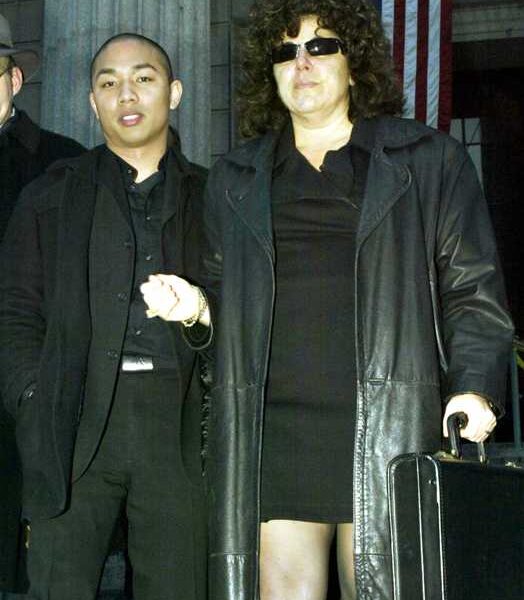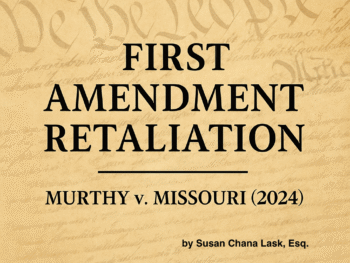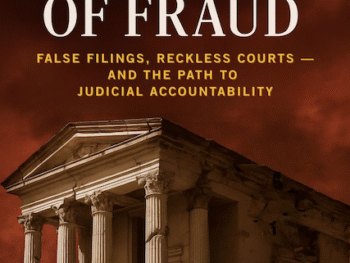Criminal Defense Made Simple: Protecting Your Rights from Police Contact to Court
Informational only, not legal advice. A plain‑English guide to what happens from the first police contact through arraignment—and how to protect your rights at every step.
(Published By Susan Chana Lask, Esq. in 2000, updated 2025. This is only informational, not legal advice)
There are different categories of crimes known as violations, misdemeanors and felonies. Each category carries different penalties.
Violations are non-violent crimes and usually carry a fine and maybe a few weeks in jail. An example of a Violation would be carrying an open beer in public or a similar petty disturbance such as disturbing the peace.
Misdemeanors usually carry either a fine and/or up to a year in jail and include acts such as false reporting or stealing property.
Felonies are the violent crimes such as burglary, rape or murder which carry or theft crimes over a certain amount of money that all carry long-term prison sentences.
When your accused of a crime you are the Defendant and the People of the State charge you through the District Attorney’s Office.
Being accused of any crime is serious because you lose your constitutional rights from your very first contact with the police to the chance of you being found guilty and imprisoned.
The Constitution values your freedom and recognizes that a person is innocent until proven guilty Beyond a Reasonable Doubt. Beyond a Reasonable Doubt is the District Attorney’s burden of proving against you and it is a very high burden to prove because there has to be absolutely no doubt in a juror’s or a judge’s mind that you committed the crime. Put another way, if you can put a doubt in their mind that you did or did not commit the crime then they can not convict you.
Most crimes have specific defenses that a Defendant can use to prove innocence. For example, if you are charged with a Battery which is hitting someone then you can claim self-defense by proving that person attacked you first, so you defended yourself by striking back. Or maybe you are in possession of stolen property, but you were an innocent purchaser of it–then the law provides you with intent and knowledge defenses to prove your innocence.
The law gives you opportunities to defend yourself for the very reason that it recognizes that, although you’re accused of a crime, there may be reasons or defenses that prove your innocence. This article is for those innocent people.
Click each subject below for inside information and tips about everything from talking to the police to the criminal trial.
CONTENTS
THE INITIAL POLICE CONTACT
-Never Visit a Police Precinct Unless You Want to Get Arrested
-Do Not Open your Door for a Detective Unless he has a Warrant for Your Arrest
-Never Volunteer Information at Anytime
-Remain Silent No Matter What & Get an Attorney
If you are suspected of a crime then the police can come and talk to you. They can come to your house, your work or find you on the street. Usually it will be a Detective in plain clothes and an unmarked car who will want to talk to you. You might find a card form the Detective under your door or a message on your phone from him asking you to call.
Remember this-YOU HAVE THE RIGHT TO REMAIN SILENT, ANYTHING YOU SAY WILL BE USED AGAINST YOU AND YOU HAVE THE RIGHT TO AN ATTORNEY.
Just because the Detective comes around does not mean you have to speak to him or see him at the Precinct. If the Detective is at your door, you do not have to open it for him unless he has a warrant. If the Detective is knocking at your door, do not answer and let him leave.
Rarely do they come around looking for you because they want to make their job easy, so instead they will hound you to come into the Precinct to “talk”. Don’t be foolish and think they’re going to share their donuts and coffee with you for a chat. Once you set foot into the Precinct you will now be on their turf.
Precincts are a whole different world with their own set of rules. The Detective will have you at his mercy where he is an expert at using different routines such as “good cop/bad cop” or violate your rights just enough to be “legal” to get you to talk. Maybe he’ll take your backpack from you or other property you came in with like your cell phone, then direct you to wait for him, leaving you alone in a room for what could feel like a lifetime. He may even ask you to write your version of the story down and then use that against you later.
Do not ever visit a police precinct if they tell you they just want to talk. Anything can go wrong. If you have a Detective that hasn’t slept for a few days and he had a bad day, then, believe it or not, you can get arrested. Unless he has a warrant for your arrest, you don’t have to talk to him and you do not have to write anything for him.
Be assured that if you are a suspect and you go to the Precinct then you will be arrested and spend time in jail, and might not get out.
PROTECT YOURSELF FROM GAMES COPS PLAY
-Never go to a Precinct, but if you do, then:
-Voluntarily arriving at the Precinct gives the Police the Right to talk to You
-You set yourself up for an arrest
-Remain silent at all times
-Note when or if they ever read you your rights
-Do not believe the Police are your friends-they are there to arrest you
-Do not believe anything the Police tell you
The police need to gain your trust. They are experts trained in gaining your trust and confidence. They know what to say and what tone to use with you.
They will lie and misinform you to get information they want. They can tell you that they have witnesses when they do not, or say they will lower the charges when they will not. If they get you to talk a few times on the phone, then next you’ll be invited to the Precinct just to “talk”. Or, if they have property of yours they can ask you to come and pick it up so they can get you into the Precinct to talk, and ultimately arrest you.
If you go to the Precinct then you went there voluntarily. That is a big plus for the Police. Once there they can talk to you and even go through your property.
The police most likely will not read you your rights because they want to create an informal, relaxed appearance so you can spill the beans voluntarily.
If your not talking then they will use the “good cop/bad cop” routine. This routine is also used when one cop is not as experienced in eliciting information from a suspect so he will get a more experienced cop to complete his work. This works by the first cop sitting with you alone in a small room and talking about the “crime”. If he’s not getting the information he wants to hear to nail you then next you’ll find yourself standing at the fingerprint machine with another more sensitive cop. Once you’re at the fingerprint machine you can be sure you’re being charged despite the fact that no one explained anything to you, read you your rights or told you what you’re being charged with because part of the game is to keep you disoriented and guessing your situation.
So now no one read you your rights, you’re getting fingerprinted and then you hear the new cop say “just tell the Detective what he wants to hear and you’ll get out of here faster on a lesser charge” — you’re being played.
First, any change in persons handling you is the good cop/bad cop game. No one else needs to handle you other than the arresting officer who will be the original person speaking with you because you are his case- he needs to process you via photos and prints.
Second, when the police tell you the consequences of a crime they intend to charge you with or that they can lower the charge do not believe anything they say because they can and will lie to you to get you to talk so they can make an arrest. The police are not your attorney, they are not your friends and they are there to do a job-make an arrest.
The only way to protect yourself is to remain silent at all times. Enforce your right by consistently stating “I am remaining silent until I have counsel.” The police can not interrogate you once you invoke that right, although they will try to interrogate you. They also can not interrogate you unless they first read your rights. Nevertheless, they will try to interrogate you without reading your rights because they are the police and you’re sitting there alone, without an attorney – anything can happen at that point.
What really should happen when you arrive at the Precinct is that the police should have you sign a paper with your legal rights listed on it (i.e.-you have the right to remain silent, anything you say can and will be held against you, you have the right to an attorney).
They should have you read your rights while they read it to you, and then have you initial each right and sign the paper at the bottom with the time and date. This paper is a good thing for the police to prove they followed procedure and it will coordinate the time of your arrest closely with the time of reading your rights.
If they do not present this paper to you then you are being played because they are making the meeting appear informal, keeping you off-guard of your legal rights and playing down the real purpose-to get information from you voluntarily.
It is not mandatory that they give you this paper with your rights because they can by law read you your rights and note in their notebook when they read you your rights. Of course, they could never read you your rights and later say they did–and you can bet that in court the police are believed over you when the arresting officer sits there in front of the judge, as he has 99 times before, and says he routinely reads every arrest their rights – while your screaming he never read you your rights when you were arrested. So anything you said that incriminates you will be said in the court.
TURN YOURSELF IN WITH AN ATTORNEY
– Never Turn Yourself In without an Attorney
– Never Turn Yourself in or get Arrested on Nights or Weekends because those are lower staffed shifts that will delay your arrest process & keep you Waiting in Jail up to 3 days
If a Detective is hounding you with phone messages and coming by your house leaving cards with your roommate or family then immediately get an attorney. An attorney can determine if the police are going to arrest you. If you are going to be arrested, then your attorney will advise you what to do and say or not say, explain the arrest process, arrange for you to turn yourself in and get you through the process quicker. Also, the police know they can not interrogate you if you are represented by counsel.
A good attorney will fax his letter of representation to the Precinct and follow you through the arrest process (see below) by calling the proper offices and getting you to arraignment and out of there quicker.
Your attorney should also fax a notice of appearance on your behalf to the Arraignment Clerk’s Office the minute he/she discovers you’ve been docketed by the District Attorney’s office. Docketed means they drafted and filed a Criminal Complaint against you and assigned a docket number to your case so it can be heard by the court.
If you do not turn yourself in, then you can be sure the police will delay your arrest process and make you sit for 3 days in jail before you see a judge because they’re upset they had to work to find you. They’ll delay filling out your paperwork and delay sending it to the proper offices. They may even lose your paperwork just to spite you.
Here’s a tip-never turn yourself in or get arrested at night or on a weekend because there are less people working those shifts and the courts close certain hours, so the process will take 3 days.
THE ARREST PROCESS
AT THE PRECINCT
When your arrested your first contact will be with the Precinct.
The person who arrests you is the Arresting Officer.
The arrest process legally can take up to 3 days (72 hours) before you see a judge for arraignment (see arraignment & Bail below). Throughout this process you must remain silent about anything except you can give your basic information such as name, residence, and anything that identifies you. But do not speak about anything else to anyone. Even to the person who might be in the cell with you. Always remain silent until your attorney speaks with you.
At the precinct a detective will interview you to get basic information like your full name, present address, family member contact information and possibly play their games (see games cops play below) to get more evidence against you. The arresting officer may even call your family or friends to verify your information.
They will run a check on you to discover if you committed other crimes or if outstanding warrants exist for your arrest. The information is also needed for the arresting officer to fill out the paperwork to get you through the arrest procedure and to the arraignment court (link to arraignment). You will be fingerprinted and arrest photos will be taken there. Then the arresting officer will make a file for you from the information, prints and photos and his notes. Next, he will fax the file to the District Attorney’s office so they can draft a criminal complaint against you and give it a docket number.
You will sit in the Precinct jail cell an average of 6 hours until they can arrange transportation for you to another place called Central Booking. You will be transported handcuffed to Central Booking alone or with other arrested persons in a police vehicle.
AT CENTRAL BOOKING
The Central Booking process can take about 4 hours. At Central Booking you will wait in line with hundreds of other arrested persons to get to an interview table where you will be asked about any health problems and more identifying information, including persons to contact, who you live with, where you work, your salary, your citizenship status and where you were born, among other things. This information will be used later at your arraignment for the Judge to determine if and what amount of bail should be imposed against you. If you do not have any contacts in the state or locally such as a job, family or a residence then the chances are a bail will be imposed against you because you will be considered a flight risk.
The best thing you can do is get an attorney to meet you at your arraignment. You can do this at Central Booking because there are pay phones there so you need to call your attorney or of you do not have one then call your family, friends or anyone else who can get you an attorney that day. That call will be short because there are hundreds of other people waiting to use the phone so whomever you call just tell them (a) the Precinct you came from, (b) where you are now, (c) the charges against you or what you believe you were arrested for and (d) tell them to get as much cash as possible, grab proof of home ownership like a deed and contact at least three bails bondsmen from the yellow pages in the area you were arrested in because you want to be prepared for getting your bail through quickly.
With your arrest location and Precinct information and your last name, a good attorney will be able to track you down using special contact numbers to the District Attorney’s office and Central Booking where your arrest number and docket number can be obtained. Meanwhile, you will be sitting in Central Booking’s most dingiest, piss-ridden, foul smelling jail cell with a load of drug addicts, hookers and a doctor for Medicaid fraud being served a cup of water and a piece of bread with some kind of “cheese” after not eating or drinking for 2-3 days. At some point you and a group of about 10 others from your cell will be brought upstairs. This means the District Attorney finished its paperwork and assigned a docket number to your file so you can be arraigned. Your attorney needs to start traveling to the arraignment court because you will be up for arraignment within the hour.
THE ARRAIGNMENT & BAIL
Arraignment means (a) you will be brought before a Judge in the courtroom, (b) you or your attorney will be handed the Criminal Complaint with the crimes charged and the factual basis to each charge, (c) the District Attorney will request bail or release you on your own recognizance and (d) you plead guilty or not guilty. The process starts when the court officer brigs you from the cell in the back of the courtroom and into the courtroom. If you were unable to contact your family, friends or an attorney when you were arrested then most likely the court will have a Legal Aide attorney appear with you. Legal Aid attorneys are in the courtroom at all times to defend the poor and most times to stand up for the unrepresented. Usually there will be about 3 attorneys from the District Attorney’s office in the courtroom and one of them will read the charges against you and request the court to impose bail at a certain amount or no bail, which they will say “ROR”, which mean “return on your own recognizance”.
Bail is determined according to the crime and your personal information. At arraignment, the District Attorney will have your personal information they obtained from their computer searches on you. If you ever were arrested, committed a crime after the age of 18, on parole or probation then they will have that information on what they call your “Rap Sheet”. If your Rap Sheet is clear of any crimes and this is your first arrest, then chances are there will be no bail set against you. However, if your Rap Sheet is clear but the crime your charged with is serious, such as involving a large amount of stolen money or includes violence, then bail can still be set against you. There are different factors affecting the setting of bail against you and all are considered by the Judge in a matter of minutes. If the District Attorney requests bail then your attorney needs to make the argument that you are not a flight risk, that you have family, friends and a job in the State or locally and that the charges against you are improper in some way. Your attorney may even get the whole case dismissed if the District Attorney’s Criminal Complaint against you is not properly drafted or signed by a proper party.
GETTING THE CRIMINAL COMPLAINT DISMISSED AT ARRAIGNMENT
-Unsigned Complaint must be dismissed
-Complaint signed by person without knowledge must be dismissed
-Complaint states Facts that do not support the crime charged-can be dismissed
The District Attorney drafts the criminal complaint against you from information received from the Arresting Officer and the victim of the crime. while your being processed through the Precinct and Central Booking, the arresting officer will fax his paperwork and information regarding your arrest and charges to the District Attorney’s office and someone from that office will then call the victim and get more information so they can properly draft the Complaint.
The complaint needs to be signed under oath by the arresting officer or the victim. If it is not signed by anyone when you appear at your arraignment then it is not “corroborated” and must be dismissed. Check out who signed the Complaint and if it is a person who was not the arresting officer or the victim then the Complaint should be dismissed. Lastly, if the facts of the Complaint do not establish each element of the crime charged or the Complaint is poorly drafted, then it should be dismissed, but most times the court will give the District Attorney a few weeks to file a properly drafted complaint.
HOW PLEAS ARE OFFERED AT ARRAIGNMENT
At arraignment the District Attorney may offer a plea to a lesser charge than what you were arrested for originally. Pleas are offered to unburden an extremely congested criminal court calendar as well as to get rid of smaller end crimes so the District Attorney can rightfully concentrate on the more serious crimes. For example, if you were arrested for a misdemeanor shop lifting and you arrive at the arraignment with a clean Rap Sheet and no prior arrests then most likely the District Attorney will offer you a violation and a few days community service with a fine. You have the option right there to get out of the criminal court’s jurisdiction and end the process by accepting the lower charge of a violation, which is not a crime but it will appear on your record in the future. If you accept the plea then you would actually plead guilty to a lesser offense on the record and the court will most likely impose a fine and community service or counseling, depending upon what you and the District Attorney agreed to. If you do not accept the plea, you will simply plead “not guilty” and continue your criminal court appearances to file various motions by your attorney and hold hearings of the officers to discover what evidence the District Attorney has against you.
As you go through the criminal court process, the plea to a lesser charge may or may not be offered again. Your accepting a plea or not is something only you and your attorney can decide based upon your circumstances. Just remember, the plea will be on your record as opposed to fighting the charges if you are innocent.
YOUR CRIMINAL COURT APPEARANCES
-If the District Attorney is not Ready for Trial by a Certain Time, Your case is Dismissed
-If you miss a court appearance, a warrant for your arrest is issued
-The District Attorney’s office is overwhelmed with cases and most times misses deadlines resulting in your case being dismissed
If you plead not guilty and you are released ROR (meaning without bail and on your own recognizance) or on bail, you will be given the next date to appear before the court. At that next date the court will give certain dates for your attorney to complete certain work on your behalf. The District Attorney has a limited period of time to complete his investigation and state on the record he is ready for trial. The time limits are mandatory to protect your constitutional right to a speedy trial-meaning, you should be able to quickly prove your innocence because being accused of a crime is a stigma on anyone and until you prove your innocence then contrary to the belief “you are presumed innocent until proven guilty”, you are actually presumed guilty, and that’s the reality.
WHAT IS YOUR RIGHT TO A SPEEDY TRIAL
So, to give you a speedy trial, the time starts running from the date the criminal complaint is filed against you; so, a trial for a violation must be held within 30 days, a misdemeanor trial must be 90 days and a felony is 6 months. The time periods are tolled or stopped because of certain motions made by your attorney or certain hearings. They are not tolled if the District Attorney requests adjournments without your consent. They are also not tolled if the District Attorney is not ready for certain appearance dates. This is called “excludable time”.
MAKE A RECORD TO PROTECT YOURSELF
At each court date there will be a stenographer which is a person actually typing every word of the proceeding to make a record of it. Your attorney must make sure the record is clear that you do not consent to an adjournment or the District Attorney was not ready. Being clear is important because the court is overwhelmed with hundreds of cases a day and the Judge will not keep a good record or sometimes the Judge’s notes on your file are unreadable and the Judge later can’t recall what happened. To be clear and to protect your rights, state on the record “Defendant does not consent to the adjournment and time should be charged to the People” or “The District Attorney is not ready and time should be charged to the People.” Make sure the stenographer hears what you say because you may later have to order those records from the stenographer to prove what happened at the hearing.











 Lask Represents Disabled Mom’s Appeal Against Wells Fargo Foreclosure Fraud
Lask Represents Disabled Mom’s Appeal Against Wells Fargo Foreclosure Fraud